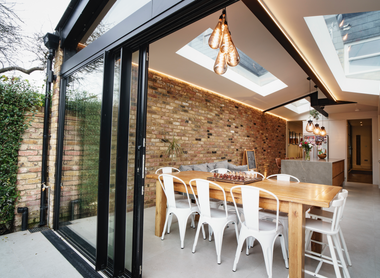Loft conversions: The ultimate guide
Loft conversions are an ideal way to add space to your house without extending its footprint. Our complete guide walks you through everything from design to costs.
A party wall is a wall that sits directly on the boundary of land between two (and sometimes more) different owners. Good examples include the walls that separate terraced or semi-detached houses — or walls that make up the boundary between two gardens (party fence walls).

The Party Wall Act 1996 applies to houses in England and Wales and was devised to prevent building work that could compromise the structural integrity of any shared wall (party wall) or adjoining properties. The Party Wall Act can be used to stop disputes between neighbours and to help resolve them if they should arise.
The Party Wall Act 1996 does not apply to Scotland and Northern Ireland where common law is used to settle party wall issues.
A party wall agreement is needed if you plan on carrying out any building work near or on a party wall. You must tell your neighbours, provide them with a Party Wall Notice and come up with a Party Wall Agreement in writing. If you use a builder or an architect then they should be able to advise you on this, although they will not serve the notice for you.
The following works require you to obtain a Party Wall Agreement:
Not all work to party walls requires a party wall agreement. These include minor works such as drilling into the wall internally to fit kitchen units or shelving. Having the wall plastered or adding or replacing electrical wiring or sockets will not require an agreement either.
A Party Wall Notice must be given to your neighbours to provide them with notice of the works you intend to carry out to the party wall in question, between two months and a year in advance of the work starting.
Planning permission is not required to serve a party wall notice and, because you will have up to a year to start work once the notice has been served, it is a good idea to do this as soon as possible in order to avoid delays. You should speak to your neighbours in person first before serving written notice in order to reassure them that you are taking the proper route and precautions. This should help you avoid disputes or misunderstandings, and enable a swift agreement to be written up.
You could also give your neighbour details of the Party Wall Act to help them understand the process — point them in the direction of the Party Wall information section on the Government's website.
In order to formally serve notice, you should write to your affected neighbour(s), including your contact information, comprehensive details of the work that you have planned, the date that work will start, as well as any access requirements over their property (perhaps to get materials or equipment onto site). In the case of adjoining leasehold properties, you must serve notice to the building’s owners as well as to the tenant(s) living there.
A handy guide, along with Party Wall Notice templates can be found on the Government’s website here. It is wise to enclose a reply letter and envelope for the neighbours to sign and return — which, if you have spoken to them before sending, should not come as a surprise.
They have a number of options:
You must wait for a response — your neighbour should let you know, in writing, within 14 days if they consent. The best case scenario is that they agree to all the works, in writing, meaning you will not require a party wall agreement, which saves on fees.
A counter notice must be issued within a month of your notice. If your neighbours don’t respond within the above timescales then the dispute resolution process begins.
Whilst failing to get a Party Wall Agreement is not actually a legal offence, not only will you be breaching a ‘statutory duty’ but you also risk having to pay for damage that wasn’t your fault. Your neighbour could claim their property has been damaged by your work and with no details or proof of the previous state of the property (which a party wall notice would have given you) there is not much you can do.
The courts tend to take a poor view of failure to serve a party wall notice and you may be ordered to pay for repairs which, in reality, may not be your responsibility. In addition, your neighbours could take civil action against you and have an injunction issued to prevent any further work until a party wall agreement is arranged. This will delay the project and could increase costs.
If, after serving notice, your neighbour either refuses consent or fails to respond, you are considered to be ‘in dispute.’
You have a few options here.

In many cases people find they do not require the services of a party wall surveyor. If your neighbour responds to your notice giving permission in writing that works can commence, there is usually no need to appoint a surveyor.
Either way, you are still responsible for ensuring any damage caused during the works is repaired. Inspect the wall with your neighbour before work starts and take and share photos of the wall in order to avoid later disputes — for example existing cracks. Some people decide to ask a surveyor to carry out a condition survey at this stage in order to minimise the risk of disputes.
If your neighbour does not give permission, you will need a Party Wall Award and, therefore, a party wall surveyor. Usually you and your neighbour will use just one surveyor (a good idea as it means only one set of fees).
Fees vary, but according to HomeOwners Alliance, a Party Wall Award currently costs around £1,000 in total.

Loft conversions are an ideal way to add space to your house without extending its footprint. Our complete guide walks you through everything from design to costs.

House extensions can really help to enhance your existing home, adding extra space to expand and improve your home. Our complete guide takes you through the steps you need to consider to get your project off to the best possible start.

Our complete guide takes you through every step of the process from how to develop a kitchen plan to finding a reputable builder and sticking to your budget - not to mention some great ideas to inspire you along the way.